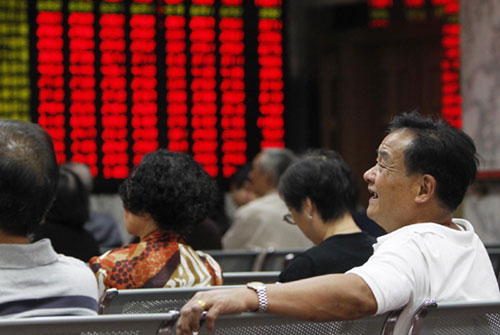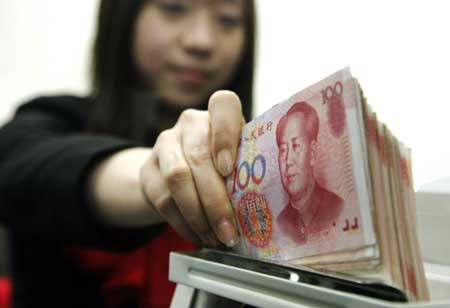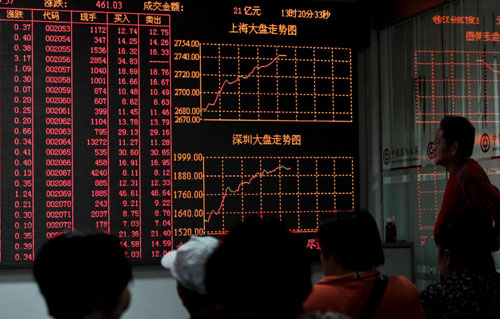Banking
- Details
- By David Cao
- Hits: 1421
China's surprise interest-rate increase is more likely to accelerate capital controls in the more export-dependent Asian economies than to elicit copycat moves, analysts said.
Tuesday's announcement by the People's Bank of China rocked global markets and sparked a widespread shift toward safer assets such as government bonds by investors concerned that one of the main engines of the global economic recovery was being throttled.
But the timing—barely 36 hours before China was due to release third-quarter data on gross domestic product—might also indicate growth is so strong that China feels it can raise rates without risking a meaningful slowdown.
"Chinese policy makers are quite risk-averse, and the fact that they're raising interest rates is a signal that they're quite confident that growth is stable in China," said Frederic Neumann, co-head of Asian economic research at HSBC Bank. Thursday's GDP release "might actually show that China's economy expanded faster than expected," he said. That would ease concerns in Asian countries that depend on Chinese purchases of their exports.
- Details
- By David Cao
- Hits: 1553
Chinese shares advanced to the five-month high on Oct 8 on the gains of gold producers and nonferrous metals.
The benchmark Shanghai Composite Index rose 3.13 percent, or 83.09 points, to close at 2,738.74 in heavy volume as the benchmark broke through the half-year 125-day moving average -- a level that local investors consider demarcates a bearish or bullish market -- now at 2,677.

The Shenzhen Component Index gained 3.86 percent, or 442.83 points, to end at 11,911.37.
Combined turnover stood at 283.42 billion yuan ($42.43 billion), up from 183 billion yuan on the previous trading day.
Gainers outnumbered losers by 814 to 41 in Shanghai and 1025 to 47 in Shenzhen.
Commodities plays were among the biggest gainers, with Yanzhou Coal Mining Co Ltd, Zijin Mining Group Co Ltd and Jiangxi Copper Co Ltd all reaching their 10 percent trading limits.
Chinese shares advanced to the five-month high on Oct 8 on the gains of gold producers and nonferrous metals. The benchmark Shanghai Composite Index rose 3.13 percent, or 83.09 points, to close at 2,738.74 on Oct 8.
- Details
- By David Cao
- Hits: 1663
The yuan on Friday climbed to the highest level since 1993 amid growing foreign demand for a faster currency appreciation.
However, a senior Chinese official warned that if the yuan appreciates too fast, it could harm the world's economy, as well as China's.
The yuan was traded at 6.6830 against the greenback on Friday, advancing 2.2 percent since China removed its peg to the US dollar in June and pledged to add more flexibility to the yuan.
China is committed to moving toward a flexible exchange rate regime but "our approach will be a gradual one", said Yi Gang, vice-governor of the People's Bank of China, the country's central bank, at a forum during the annual meeting of the International Monetary Fund (IMF) and World Bank in Washington on Thursday.
- Details
- By David Cao
- Hits: 1710
Liquidity levels in the capital markets will improve and foreign exchange borrowing costs will reduce as more companies start settling cross-border trade with yuan, said analysts.
"There is a growing number of Chinese companies requiring their overseas business partners to use yuan in trade," said Ling Jiamin, a manager at Hong Kong-based Citigroup Inc.
HSBC Holdings Plc and Standard Chartered Plc have started yuan-settlement services such as channeling the yuan from abroad into the Chinese capital markets. To encourage usage, these banks offer incentives such as discount in transaction fees.

- Details
- By David Cao
- Hits: 1638

Ping An Insurance topped a list of China’s top 100 private-sector companies for 2009 released today by China Europe International Business School (CEIBS).
The report aims to give a glimpse into the performance of non-state-owned companies after the financial crisis and the increasing involvement of private companies in international capital markets.
Also in the top five in the ranking, in order, were retail chain Suning Appliance, appliance maker GD Midea, retail chain Gome Electrical Appliances and China Minsheng Bank. Numbers six and seven were electric car maker BYD – which is about 10% by Warren Buffett’s Berkshire Hathaway, and Fosun International – which invests in U.S.-listed companies such as Focus Media, Chindex International and Tangjitang Chinese Medicines.
Read more: Ping An Tops CEIBS List Of China’s Private Sector Companies
More Articles …
Page 18 of 28
